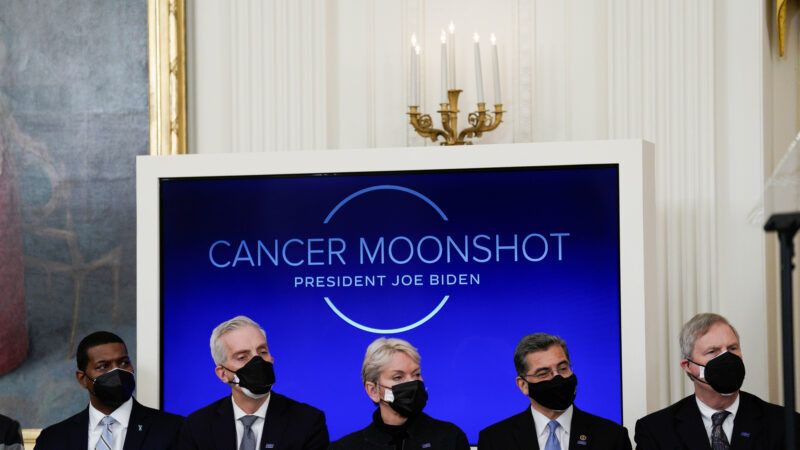More Bureaucracy Won't Cure Cancer
Biden's "supercharged" cancer moonshot is little more than a hollow promise.

The American Cancer Society (ACS) estimates that 1.9 million new cancer cases and 609,360 deaths from cancer are expected to occur in the United States in 2022. Cancer narrowly trails heart disease as the leading cause of death in the U.S.—making it an easy cause to rally behind. President Joe Biden plans to do just that amidst gridlock on his big ticket legislative plans.
Nearly every president since Nixon has promised to cure cancer in one way or another. On the 2020 campaign trail, both Biden and Donald Trump vowed to find a solution for the myriad classes and types of cancer. But with over 200 types, cancer is the very definition of a problem that doesn't have a one-size-fits-all solution.
As vice president, Biden led the original cancer moonshot program that President Barack Obama claimed would make "America the country that cures cancer once and for all." But as Ronald Bailey wrote for Reason is 2017, this plan was full of "the usual federal bureaucratic efforts of 'catalyzing', 'leveraging', and 'targeting'." As part of the initiative, Congress in 2016 passed the 21st Century Cures Act, which allocated $1.8 billion to cancer research—$400 million of which has yet to be spent.
The fight against cancer has progressed, but it's not nearly over. The ACS reports that the risk of dying from cancer in the U.S. has decreased over the past 28 years, with the cancer death rate for adults falling 32 percent between 1992 and 2019.
Today, President Biden announced that he would "supercharge" the previous moonshot plan. Biden wants to "reduce the death rate from cancer by at least 50 percent over the next 25 years, and improve the experience of people and their families living with and surviving cancer— and, by doing this and more, end cancer as we know it today." This initiative includes a dedicated "Cancer Cabinet" that includes personnel from nearly every health organization that currently receives significant funding from the federal government.
First Lady Jill Biden was exactly right when she proclaimed we are in a "golden age of research and discovery." Among cancer researchers, the most exciting developments in the last year have been magnetically responsive bacteria, advancements in personalized medicine, and chronotherapy. The same mRNA technology used in COVID vaccinations may be a key player in the fight against cancer too. The U.S. should focus on reducing the barriers that encumber access to these treatment technologies—and other promising remedies—for patients who don't have time to spare.
It felt like the world collapsed in on my large family when, out of the blue, my father was diagnosed with cancer late last year. Full of unanswered questions, we still worry about what he may miss. But, we quickly discovered that our story is all too familiar. The majority of U.S. families, including Biden's, have been affected by this deadly disease. There are countless reasons to believe that the government has slowed cancer prevention with the intent of racing towards a cure. Like many problems, there is too much at stake with cancer to let politicians dictate the solution.



Show Comments (22)